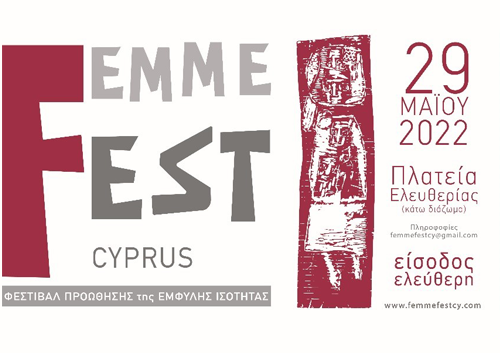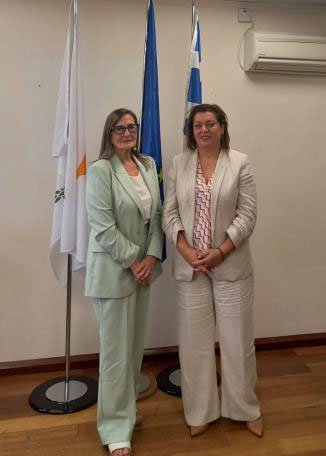
Femme Fest Cyprus! Το πρώτο φεστιβάλ για την Ισότητα των Φύλων είναι γεγονός!
April 27, 2022
IAW/HAD Parallel Event on the 16th March 2022 at the NGO CSW66 forum
April 28, 2022Katherine Clerides
When the crisis over Ukraine broke out, quickly followed by the Russian invasion I once again had to ask myself why, when we have so many alternative dispute resolution tools available to us, do we end up going back to the primitive method of imposing our will on another by the use of force?
Talking to a friend recently about this, he reminded me that this is the way of the world. At the time of the ancient Greek city states, when Athens made unreasonable demands on one of its neighbouring city states, they protested that the demands were unfair and not justified. The Athenians replied, true, but we have the force needed to impose them.
Why should we imagine that things would be any different today? Perhaps the mistake that enlightened liberals made following the Second World War was to assume that the law of the strong had evaporated simply because it had been shown to be unjust and in the long term not cost-effective and untenable.
Many, I included, believed that after the devastation of the Second World War the mechanisms put in place by the international community would be sufficient to prevent another catastrophe. However, as we have seen again and again over the last few decades this newly established world order has failed to meet the challenges of real politics.
It was the German writer and politician, Ludwig von Rochau, who originally coined the phrase “realpolitik” in the 19th century. By this phrase he meant that “the law of power governs the world of states just as the law of gravity governs the physical world.”
However, we now know that the physical world is much more complex than Newton’s theory of gravity. Should we not also realize that we need more nuanced policies in the relationships between states and in international relations? Can we really afford to play power politics which prioritizes national self-interest over the interests of other nations or the international community?
Once again, as with climate change and the Covid-19 pandemic, the Ukrainian crisis has already and will continue to disrupt the world economy and the economies of every single country on the globe. If not carefully handled it could even lead, God forbid, to a third world war.
In the case of the Ukrainian crisis there seems to have been a massive failure of diplomacy and a failure to understand fully the concerns of the parties involved. Perhaps this was due to the fact that there are probably hidden agendas on the part of all the parties or principal actors involved, which will become clearer in due course, when we are able to sift through both the information and disinformation currently circulating.
However, the challenge for those of us involved in conflict resolution (CR), mediation or negotiation is to make the value of these process visible to the wider public as well as political actors who are generally trapped in their nationalistic narratives. Putting yourself in the other person’s shoes is definitely not a skill that most politicians possess or even want to possess, because they are still thinking in terms of winning over the other.
In the best-case scenario politicians are thinking in terms of what they believe, correctly or incorrectly, serves the interests of their country in the short term. Even more often, we see that politicians are first and foremost interested in staying in power or getting themselves re-elected, so they tend to tell people what they want to hear and follow public opinion rather than lead it.
In conflict situations the narrative is always that the other side is to blame, and our side are the victims. This narrative is not conducive to encouraging political leaders to make compromises which are necessary for negotiated solutions, but which are difficult to sell to the electorate.
In many countries proponents of ADR have been successful in convincing the wider public that CR and mediation are useful in the context of interpersonal, family, organizational and even community disputes.
A major challenge for those of us involved in this field now is to push for greater recognition and acceptance of the idea that these CR/mediation skills need to be brought into play in political negotiations between states and in the international arena.
A recent document of the Alliance for Peacebuilding organization cogently makes the case for the need to reframe peace and peacebuilding. The general public need to understand that peace and security are not primarily based on military might.
In today’s world people and communities around the globe are interconnected. To promote peace and avoid violent conflict we must create the conditions for peace through the on-going work of building bridges across social divides in areas of conflict, both within and between countries.
When we support peacebuilding in one part of the world it benefits all of us. Alternatively, when nations go to war in one area of the world, as we have seen in the current war in Ukraine, nations beyond the immediate warring parties are impacted. We need to think of peacebuilding as a cost-effective alternative to militarism and war.
The report stresses that in the political context the narrative of connection can help build a meaningful understanding of peace building as a counter to militarism. However, in order for this narrative to shift public thinking it has to get into public discourse, it has to become part of how we talk about peace and conflict. This is of course a major challenge and will not happen overnight, but the work needs to start now.
This latest political crisis underlines the need for us to embed the training of CR skills from an early age and throughout the educational system as well as for social organizations and groups, including diplomats and politicians with specific further training for those professionals who deal with conflict in their jobs such as politicians, diplomats, trade unionists, CEOs, law enforcement……., the list is endless because there is almost no profession that does not have to deal with conflict.
In the context of international diplomacy it is interesting to note that the US State Department has taken on board the idea that early preventative, well-informed diplomacy, using the CR mindset can be used to de-escalate crises and avoid them in the future.
In March 2022 the US State Department had the public launch of its Negotiation Support Unit which has the stated aim “of changing the way we do diplomacy and linking it to how we build sustainable peace” according to head of the unit, the Assistant Secretary of State for Conflict and Stabilization Operations, Anne Witkowsky.
It comprises a team of CR experts who will advise diplomats who have the on the ground country expertise and help them think through complex political negotiations. In the past this had been done on an ad hoc basis, this unit puts the work on a more organized, permanent basis.
The Unit aims to tap into the full universe of CR resolution expertise acting as a conduit for civil society and academics as well as engaging with the peace building community in order to tap into the collective brilliance in the field through the Negotiation Support Network, a network of international peacebuilding practitioners and academics.
Was this resource used in the Ukrainian context one wonders? And if not, why?
In addition to bringing the CR mental framework into politics both national and international we need to focus on de-escalation and avoidance by early intervention/prevention, sometimes known as upstream intervention.
This concept seems particularly relevant in the Ukrainian context where there has long been a divide between the west and east of the country in addition to the on-going tensions between the Ukraine and Russia.
Could the UN not set up some sort of Upstream intervention/ prevention unit one wonders to assist the parties before things get out of hand. Obviously who would particate in such efforts in each case might prove a stumbling block, but if the teams are largely made up of academics their nationality should not be such an issue and if they were headed by respected figures such as a member of the Elders group this would give them added weight. Much of the work could be outsourced since there are reputed CR institutions around the world which could be mandated and coordinated by the UN unit in each specific case.
This would be somewhat along similar lines to the bi- partisan Global Fragility Act passed by the US Congress at the end of 2019 focusing on preventing the growth of extremism in fragile states. The Act directs the Department of State to establish an interagency Global Fragility Initiative to stabilize conflict afflicted areas and to establish funds to support such efforts. On April 1st, 2022, the first four priority countries and a region were announced: Haiti, Libya, Mozambique, Papua New Guinea, and Coastal West Africa. The accompanying press release notes that the announcement is timely because global violent conflict is at a 30-year high. Congress believes that the Act, if successfully implemented, will fundamentally modify the way the US government operates in addressing the drivers of conflict through its whole of government approach.
The philosophy underlying CR, mediation, reconciliation, and peacebuilding is imbued by a spirt of hope that problems can be solved through genuine dialogue and deeper understanding, differences can be overcome, and bridges built so that we can build a fairer and more positive future for all.
While power politics, the game being played today, is a theory in international relations which contends that distributions of power or changes to these distributions of power and national interests are the fundamental causes of war. Power politics prioritizes national self interest over the interests of other nations or the international community.
Perhaps an intermediate approach would be to try and solve some regional problems, such as for instance the issues over energy and the exclusive economic zones between Greece, Turkey, and divided Cyprus through an over-all exchange of gains and losses leading to an acceptable compromise for each party involved. However, for such an approach to work there needs to be an awareness and acceptance of the need for compromise in the public discourse of all the parties involved.
The same can legitimately be said about many other on-going and potential conflicts, including the Ukrainian today and the possible conflict over Taiwan in the very near future.
So where does this leave us? Is CR a pie in the sky in relation to real life politics? Probably yes, at this point in time, but probably not in in the not-so-distant future, if we are to cope with the major challenges that lie just ahead, and if we want to survive as a species on this planet.
Katherine Clerides, 16.4.22






